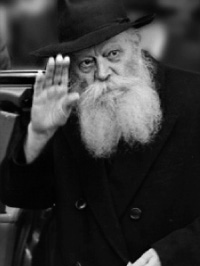The suffering of all Jews is the suffering of Moshiach. And not only in matters that for Moshiach they are considered suffering but matters of concern to simple Jews, their suffering. For there are indeed such people who have no connection to spirituality, and their only concerns are things that are seen, physically. There must be solidarity with them as well, in their particular state and condition.
Translated by Boruch Merkur
“HE BEARS OUR ILLNESS…AND HE IS CRUSHED BY OUR TRANSGRESSIONS”
Regarding Moshiach it is said that he possesses the virtue described in the verse, “He bears our illness and he suffers our pain…he is defiled by our iniquities, crushed by our transgressions” (Yeshayahu 53:4-5). Moshiach stands with the Jewish people, using all the resources at his command in order to help them, as they are, in their present state. Thus it says, “he is defiled by our iniquities, crushed by our transgressions,” for he is together with the Jewish people, helping them in their [lowly] condition. He helps them, for example, by devoting his faculty of speech to teaching the Jewish people words of Torah, spanning both its revealed and esoteric dimensions.
WHY WAS THE REBBE SILENCED FROM ON HIGH?
This quality was likewise apparent in the Rebbe Rayatz, whose yahrtzait we are observing. Indeed, the Rebbe Rayatz was once asked: Rebbe, even if there are complaints [On High] against the Rebbe and they want to mete out punishment, why is it necessary for the punishment to affect the Rebbe’s faculty of speech in particular? [That is, in his later years, the Rebbe Rayatz suffered a debilitating speech impediment.] Throughout the Rebbe’s life, he used his ability to speak for the dissemination of Judaism, a mission the Rebbe pursued with self-sacrifice, with his money and with his spirit. Indeed, the Rebbe has succeeded in this manner, fashioning a dwelling place for G-d in this world. Why then does the punishment have to strike a faculty that was utterly devoted to G-d?
But this affliction the Rebbe Rayatz suffered constitutes the concept of “He bears our illness.”
 HE DRESSES NO MORE THAN A SINGLE WOUND AT A TIME
HE DRESSES NO MORE THAN A SINGLE WOUND AT A TIME
The example cited in the Gemara regarding Moshiach is that “he sits among the impoverished and suffers illness…applying one bandage and untying another,” meaning that he dresses no more than a single wound at a time, in order that when the Jewish people repent and “they are immediately redeemed,” Moshiach will be ready to come that very instant, without any delay, even a single extra moment.
But at first glance, it is difficult to fathom how Moshiach can be described as being afflicted with wounds?
The answer is, “I am with him in suffering.” The suffering of all Jews is the suffering of Moshiach. And not only in matters that for Moshiach they are considered suffering but matters of concern to simple Jews, their suffering. For there are indeed such people who have no connection to spirituality, and their only concerns are things that are seen, physically. There must be solidarity with these Jews as well, in their particular state and condition.
Although there is the concept of harsh labor in the spiritual realm (“‘With cement (b’chomer)’ – this refers to logical inference (kal v’chomer); ‘and with bricks (u’vi’leveinim)’ – this refers to the determination of Torah law (libun hilchasa),” as elucidated in Torah Ohr), nevertheless, there are those who are unaware of all of this. And even if they are aware, they do not understand the concept of toiling in the analysis of Torah. Rather, to them, suffering means poverty or injuries in the simple sense. Moshiach shows these people as well that he is “with them in [their] suffering.”
THE SPECIAL VIRTUE OF MOSHIACH
Indeed, this is the special virtue of Moshiach – that he stands together with all the Jewish people.
And this is the lesson for every single person:
One should interact with his or her acquaintances – an adolescent or an elderly person, man or woman – at the level where he or she is now.
And in so doing, we leave Egypt – for “all the exiles are called Egypt” – and we experience the Future Redemption, regarding which it is said, “As in the days of your exodus from Egypt I shall show you wonders.” That is, even when compared to the exodus from Egypt, the miracles of the Future Era will be seen as “wonders.”
And this will take place soon with the advent of our righteous Moshiach, “the joy of the days of yore shall be upon their heads” (Yeshayahu 35:10).
(From the address of Shabbos Parshas B’Shalach, 17 Shvat 5730, bilti muga)